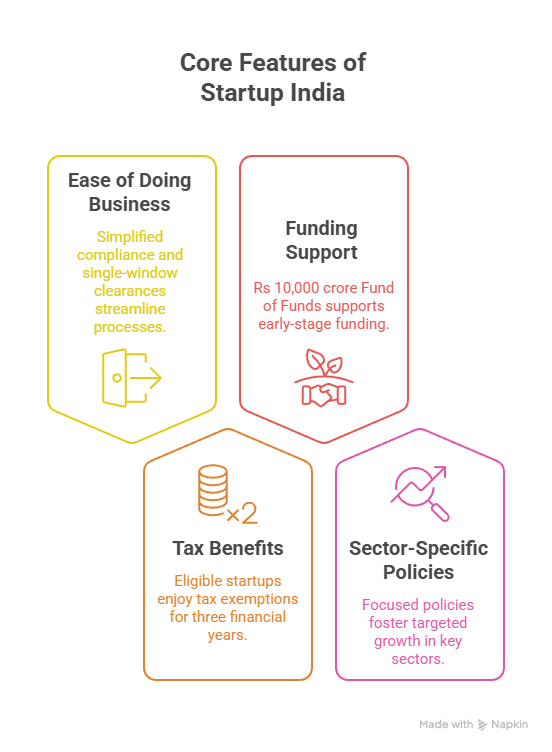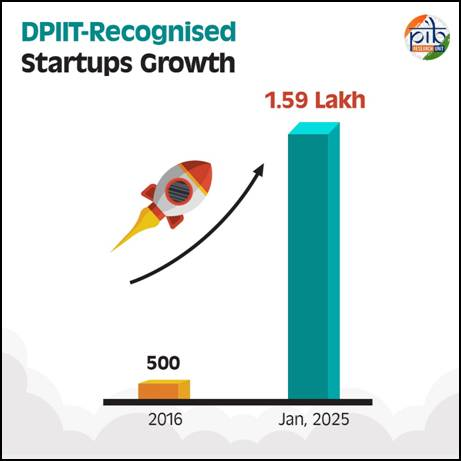Indian Economy
Startup India Revolution
- 18 Sep 2025
- 8 min read
For Prelims: Startup India, Digital India, Aadhaar, UPI, BharatNet, Fund of Funds for Startups, iDEX, ADITI, Intellectual Property Rights, Digital Personal Data Protection Act, 2023, Skill India.
For Mains: Role of Startup India in transformation of Indian economy, associated challenges and way forward.
Why in News?
The Startup India initiative has been instrumental in transforming India’s innovation ecosystem, fostering the growth of numerous startups.
- According to the Future Unicorn Report 2025, 11 new startups have joined India's unicorn club in 2025.
How has Startup India Transformed India’s Innovation Ecosystem?
- Building the Innovation Stack: Digital India, Aadhaar , UPI, and BharatNet have built a digital public infrastructure that lowers startup barriers, expands access, cuts costs, and drives an inclusive innovation ecosystem.
- Fund of Funds for Startups and credit guarantee schemes provided critical capital support for early-stage startups e.g., Fashinza (B2B marketplace streamlining the apparel and fashion supply chain).
- Ease of Doing Business reforms like single-window clearances and online systems have streamlined approvals, significantly reducing the time and cost of starting a business.
- These reforms created a layered innovation ecosystem, or innovation stack, enabling startups to scale rapidly.
- Unicorn Surge: By mid-2025, India had 118 unicorns (4 in 2014), with firms like Zomato, PhonePe, Razorpay, Ola, Meesho, and Delhivery solving local challenges and going global.
- A unicorn is a privately held startup company with a valuation of over USD 1 billion.
- Diversified Startup Ecosystem:
- FinTech: UPI established India as a global leader in digital payments.
- SpaceTech: Post-2020 reforms enabled private players like Skyroot Aerospace and Agnikul Cosmos; India now has 300+ startups in space.
- DefenceTech: Over 600 startups under iDEX and schemes like ADITI are driving indigenisation in defence manufacturing.
- Startup Dividend: Startups have generated over 12 lakh direct jobs and millions of indirect roles, while reducing import dependence and boosting exports, strengthening India’s global economic standing.
What is the Startup India Initiative?
- About: Launched in 2016, the Startup India initiative supports entrepreneurs by fostering a strong innovation ecosystem through tax benefits, simplified compliance, and funding access to drive economic growth and employment.
Core Features:
- Flagship Schemes Under Startup India:
- Startup India Seed Fund Scheme (SISFS) offers financial assistance to startups for proof of concept, prototype development, and product trials.
- Credit Guarantee Scheme for Startups (CGSS) facilitates collateral-free loans to startups to ensure access to credit.
- Startup Intellectual Property Protection (SIPP) provides startups with assistance in patent filing, trademark registration, and Intellectual Property Rights (IPRs) protection at reduced costs.
- Key Achievements:
- Growth in Startups: The number of DPIIT-recognized startups surged from 500 in 2016 to 1.59 lakh in 2025.
- Startup Ecosystem: India has emerged as the third-largest startup ecosystem globally, home to 100+ unicorns.
- Job Creation: Over 16.6 lakh direct jobs were generated by startups as of October 31, 2024.
- Women Empowerment: 73,151 recognized startups have at least one woman director, reflecting progress in gender inclusivity.
What are the Key Challenges Facing India’s Startup Ecosystem?
- Funding Constraints: Startups in Tier-II and Tier-III cities struggle with funding, which dropped from Rs 2,202 crore in July 2024 to Rs 630 crore in August 2024.
- Regulatory Complexity: India’s complex regulatory environment poses challenges for startups, with debates under the Motor Vehicles Act, 1988 on app-based cab classification and compliance under the Digital Personal Data Protection Act, 2023 increasing legal and administrative burdens.
- Growth Challenges: Despite strong initial growth, about 90% of startups fail within five years due to scaling difficulties, operational inefficiencies, and obstacles in entering new markets.
- Market Saturation: Intense edtech competition has caused market saturation, shrinking margins, and unsustainable cash burn, with the post-pandemic downturn highlighting consolidation risks.
What Measures are Needed to Strengthen India’s Startup Ecosystem?
- Enhanced Tax Benefits: Extend tax incentives from 3 to 5 years, with additional breaks for deep-tech startups and those addressing national priorities, following global examples like Israel’s 12% corporate tax for tech firms.
- Boosting Market Access: Require a fixed percentage of government procurement to come from startups, creating substantial market opportunities for them.
- Decentralized Startup Ecosystem: Develop tier-2 and tier-3 cities as startup hubs by improving infrastructure and offering incentives, using a hub-and-spoke model where larger cities support surrounding smaller cities.
- Skill Development: Expand sector-specific skill programs under Skill India, focusing on emerging technologies like AI, blockchain, and IoT to create a future-ready startup workforce.
Conclusion
India’s startup story is a civilizational reset of confidence. The journey from Startup India to Unicorn Nation captures the essence of a new India: bold, innovative, and globally ambitious. Startup India has transformed India from a job-seeker to a job-creator economy, driving innovation, unicorn growth, and employment across sectors like FinTech, SpaceTech, and DefenceTech, supported by tax incentives, funding, skill development, and decentralized ecosystems for long-term success.
|
Drishti Mains Question: Q. While the unicorn boom showcases success, India's startup ecosystem faces significant challenges in funding and regulation. Discuss the measures needed to ensure sustainable and inclusive growth. |
UPSC Previous Year Question (PYQ)
Prelims
Q. What does venture capital mean? (2014)
(a) A short-term capital provided to industries
(b) A long-term start-up capital provided to new entrepreneurs
(c) Funds provided to industries at times of incurring losses
(d) Funds provided for replacement and renovation of industries
Ans: (b)
Mains
Q. Scientific research in Indian universities is declining, because a career in science is not as attractive as are business professions, engineering or administration, and the universities are becoming consumer-oriented. Critically comment. (2014)








